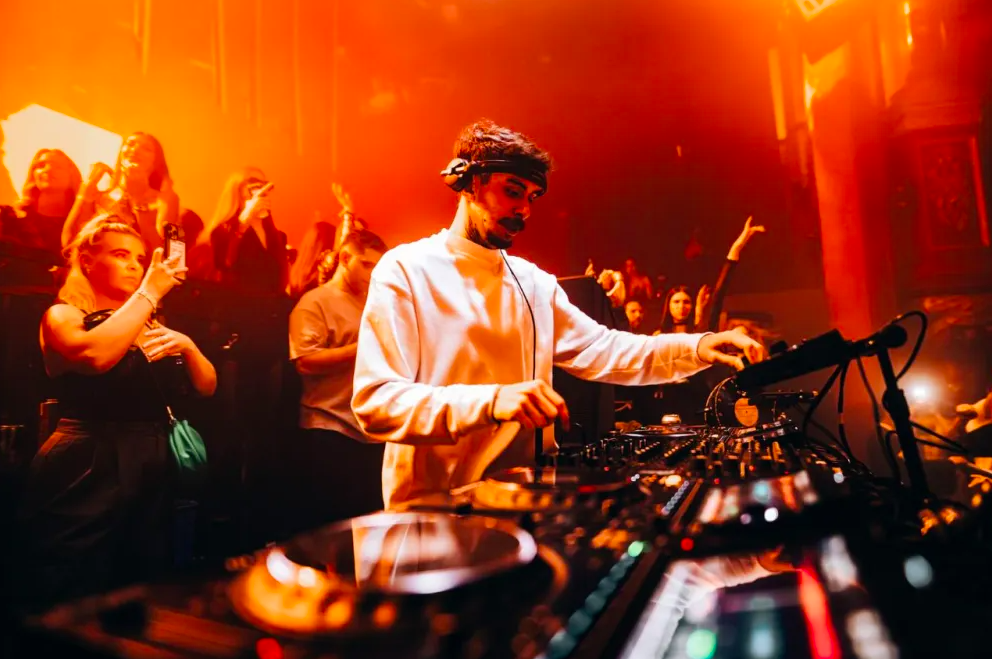Mochakk is no TikTok DJ
DJ Mochakk has escaped from the "house cradle" of TikTok to the world's most renowned festivals. Is this a sign of a closer connection between the clubbing and pop worlds?
Courtesy of Mochakk // MOC2 - Via CM Robisson and Enhanced NR
Courtesy of Mochakk // MOC2 - Via CM Robisson and Enhanced NR
If you are a devoted house music lover, you definitely don't need an introduction to who Mochakk is. On the other hand, if you are among those who struggle with this genre and have no intention of getting into it, let us continue.
Pedro Maia, a.k.a. Mochakk, was born in Brazil in 1999. Immersed in the culture of skating and hip hop, he began to take his first steps in the musical world at the age of 15, first as a beatmaker and later by approaching electronic music. After discovering the house genre, he became a meticulous student, getting more and more passionate and starting to make his first waves in his hometown in Brazil. Described by his father as a “rock kid”, “nerd music guy” and “jazz guy”, this gives an idea of how borderless the Brazilian boy's world has always been.
A Korn and Linkin Park fanboy who grew up with his mother's love for disco, ‘70s funk, and new wave. All of these influences allowed him to create his own unique style and experiment with house music.
Mentioning a passion for skateboarding is no coincidence. This culture is closely linked to hip-hop and ‘90s sample-based tracks, which led Mochakk to experiment with early production, attempting to recreate beats, drum sounds, and timbres. Encouraged by his father to attend music production classes at the age of 18, his music education exposed him to a wave of new music material. After the release of “Dong” in 2018, his career slowly took off in Brazil, but it was in 2020 that the biggest shift came. After a tweet from John Summit who said: “If you're a DJ and you're not on TikTok, you’re wasting your time. It’s the only platform that allows you to go viral without much of a following”, Mochakk posted a snippet of a live set that went viral immediately.
It's easy to imagine considering the energy that defines his DJ sets. While most DJs stay behind the deck, Mochakk brings his whole body to the stage to visually interpret the music for the audience through dance, acting, and gestures. Since making his debut on TikTok in 2020, the Brazilian DJ has played at major festivals like Cercle and Coachella. Many people consider him to be one of the best around, while others think his music is formulaic and doesn't bring anything new. But how much does this have to do with ethical issues related to the core of the clubbing genre?
Clubbing, the ‘70s subculture that featured house music, dance music, techno, and so on, used to be a scene exclusive to minorities who were excluded elsewhere. But this reality has definitely changed. DJs like Mochakk, who have gained popularity thanks to TikTok, are criticized for being more about their image and popularity than their music and the true essence of the genre.
Some argue that a once exclusive genre like house music is becoming more mainstream and pop-oriented. Surely house music in 2024, like anything else, is heavily influenced by current trends and norms. This has led festival and club organizers to prioritize the current phenomenon over the quality of the music being offered. It would be interesting food for thought if it were not for the fact that in today's society we have learned to come to terms with these issues, to separate appearance from true quality, and to resign ourselves if sometimes the two are mixed up in a lineup. How much sense does it make to demolish artists who are blatantly popular with the public just because they have chosen the means of their generation, considering how difficult it is to make one's way in the music industry today? Taste remains something sacred, and as much as we may all be anesthetized by words like social, views, trends, etc., quality is something that is still recognized (by the public!) and exists. (I am reminded of Grimes' disastrous DJ set at Coachella 2024).
Mochakk doesn't seem to be a classic TikTok DJ, and he also seems to have solid ideas about the contemporary house scene. Quoting him: “In two years’ time, we will still have a solid tech house scene, but the tech house sound that reaches the mainstream will already be different. Music with soul, however, stands the test of time: I often play tracks from 2014, 2009, 1999, or whatever, and they still work. They are not dated because they were not made with the current time in mind”.


